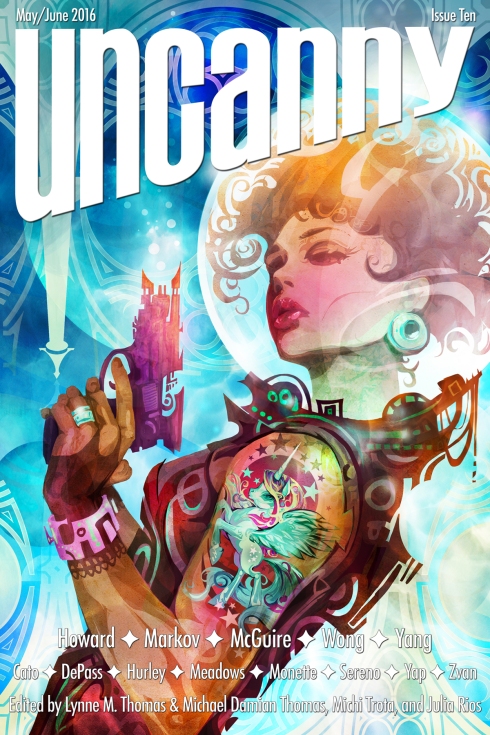Hey y’all! Long time, no see, huh?
For 2016 I did not have any awards-eligible works appear, but that doesn’t mean I won’t come on here to tell you who I think you should nominate for the final Hugo ballot.
Best Novel
Borderline – Mishell Baker
Is this the best debut novel I’ve ever read? Maybe. Is that question hyperbole? Certainly not! Borderline is the best book I read last year, and thankfully, it also came out in 2016.
If you like urban fantasy, read Borderline. If you don’t usually like urban fantasy, check it out anyway, because our protagonist is a disabled woman with Borderline Personality Disorder who ends up working with faeries.
Ghost Talkers – Mary Robinette Kowal
I was sold on this book the moment I heard the premise at a reading Mary did in SF back in 2015: mediums in the British army gathering battlefield intelligence from fresh ghosts during World War One. This book delivers on that promise in spades. There are lots of things I want to say about this book that are huge spoilers, so instead I’ll say this: I want Mary to write more in this world, and once you read this book, you will too. A Hugo nom can help make that happen.
Best Short Story
“This is Not a Wardrobe Door” – A. Merc Rustad, Fireside
This was the first short story I read in 2016, and the fact that it’s stuck with me these past 12 months should be an indication of how good this post-portal-fantasy story is. Seriously. It’s not that long. Go read it right now. LINK
“Our Talons Can Crush Galaxies” – Brooke Bolander, Uncanny Magazine
Short, violent, heartbreaking, triumphant. I love the hell out of this story. It’ll take you just a couple minutes to start loving it, too. Go! LINK
“The Green Knight’s Wife” – Kat Howard, Uncanny Magazine
Holy crap, y’all. This is a late addition, just rescued from my tab-purgatory today, and it’s just. Holy hecking eff, y’all. I love me some fabulism, and this right here hits that spot perfectly. Not your average wintertime story. LINK
Best Editor, Short Form
Lynne and Michael Thomas
The Thomases have done amazing work at Uncanny Magazine, which should be evident from the fact that Uncanny won a Hugo last year in its first year of eligibility. They’re quality folks.
Brian J. White
Brian is at the helm of Fireside, which has published some of the best fiction to come out in the past year. He is quality people.
Best Semiprozine
Uncanny Magazine
Uncanny has been publishing wonderful, vital fiction since issue 1, and this year has been no exception.
Fireside
Fireside has been on a roll the last couple years. They’ve published many of my favorite stories from many of my favorite authors. They also work really hard to make sure that their authors get paid and get paid well.
Best Related Work
The Women of Harry Potter – Sarah Gailey, Tor.com
Sarah’s series of essays is wonderful. You will be filled with feels and reminded that HP is maybe even more relevant today than it was when it was written. LINK
#BlackSpecFic Report, Fireside
This series of essays takes a powerful look at the state of speculative fiction today and the ways that racism is still present and insidious. LINK
Best Professional Artist
Galen Dara
Seriously, look at this cover for Uncanny.

“Bubbles and Blast Off” – Galen Dara, Uncanny Magazine, Issue 10
John W. Campbell Award for New Writers
Sarah Gailey
Sarah kinda exploded onto the scene a little while ago (I even talked up the first of her stories that I read on here), and she’s just continued to shine since that time. Recommended stories include “Look,” from the post linked above; “Haunted,” Fireside; and “Bargain,” Mothership Zeta.
I’ve undoubtedly left off things that you love and forgotten things that I love, so this post may be followed by addenda. And if there’s something that you love that you think I’d love, please let me know in the comments!



